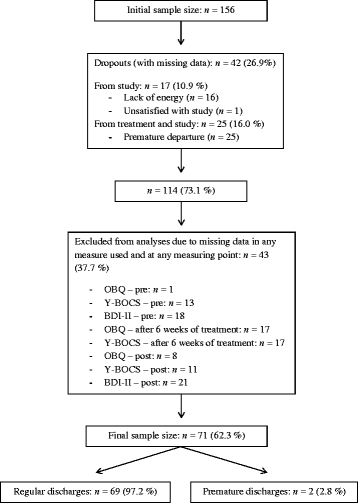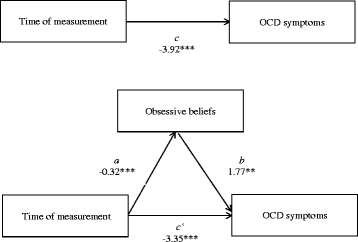Change in obsessive beliefs as predictor and mediator of symptom change during treatment of obsessive-compulsive disorder - a process-outcome study
- PMID: 27388205
- PMCID: PMC4937602
- DOI: 10.1186/s12888-016-0914-6
Change in obsessive beliefs as predictor and mediator of symptom change during treatment of obsessive-compulsive disorder - a process-outcome study
Abstract
Background: Cognitive models of obsessive-compulsive disorder suggest that changes in obsessive beliefs are a key mechanism of treatments for obsessive-compulsive disorder. Thus, in the present process-outcome study, we tested whether changes in obsessive beliefs during a primarily cognitive behavioral inpatient treatment predicted treatment outcome and whether these changes mediated symptom changes over the course of treatment.
Methods: Seventy-one consecutively admitted inpatients with obsessive-compulsive disorder were assessed with the Yale-Brown Obsessive-Compulsive Scale and the Obsessive Beliefs Questionnaire at treatment intake, after six weeks of treatment and at discharge, and with the Beck-Depression-Inventory-II at intake and discharge.
Results: Changes in obsessive beliefs during the first six weeks of treatment predicted obsessive-compulsive symptoms at discharge when controlling for obsessive-compulsive and depressive symptoms at intake in a hierarchical regression analysis. Multilevel mediation analyses showed that reductions in obsessive beliefs partially mediated improvements in obsessive-compulsive symptoms over time.
Conclusions: Our findings indicate that decreasing obsessive beliefs in inpatient cognitive behavioral therapy for obsessive-compulsive disorder might be a promising treatment approach.
Keywords: Change mechanism; Cognitive behavioral therapy; Inpatient treatment; Mediator; Obsessive beliefs; Obsessive-compulsive disorder.
Figures


References
-
- American Psychiatric Association . Diagnostic and Statistical Manual of Mental Disorders, Fourth Edition, Text Revision. Washington, DC: American Psychiatric Association; 2000.
-
- Ayuso-Mateos JL. Global burden of obsessive-compulsive disorder in the year 2000. Geneva, Switzerland: World Health Organization; 2000.
-
- Huppert JD, Simpson HB, Nissenson KJ, Liebowitz MR, Foa EB. Quality of life and functional impairment in obsessive-compulsive disorder: A comparison of patients with and without comorbidity, patients in remission, and healthy controls. Depress Anxiety. 2009;26:39–45. doi: 10.1002/da.20506. - DOI - PMC - PubMed
MeSH terms
LinkOut - more resources
Full Text Sources
Other Literature Sources
Medical

